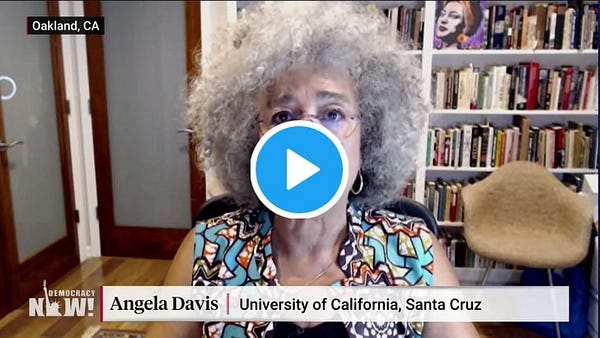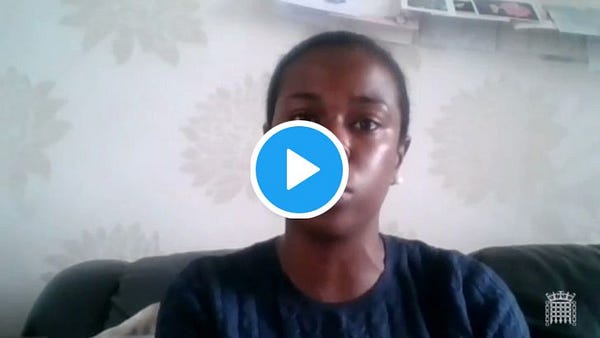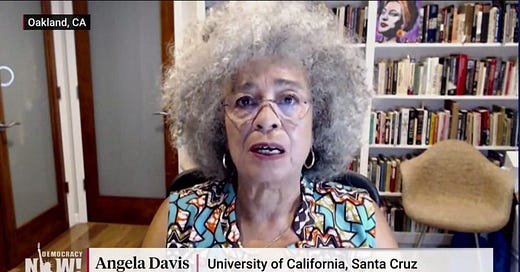June 2020: Defund the police
Black Lives Matter protests against police brutality highlight the racist and misogynist nature of law enforcement and force a public debate about how to change things for the better
Dear StopWatchers,
This month, we’ve seen the concerns of a medical pandemic give way to an underlying racism pandemic, and it is through the international wave of outrage and solidarity following the killing of George Floyd in the United States that many in the UK have learned just how far we are from the goal of fair and accountable policing for all.
However, we continue to fight, and, in the case of Neomi Bennett – a nurse we supported in her legal battle against the Metropolitan Police – we succeed! Now her conviction for obstructing police is overturned, Neomi will now bring a claim against police for her treatment that night. While it is great news that her conviction has been overturned, it should never have happened. As Neomi herself said: ‘I feel I have to protect myself from the police more than anything else as a black person in London’.
We couldn’t do this without your support, and in these exceptional times, we’d like to thank everyone who donated to our June fundraiser. You helped raise over £100k! We are incredibly grateful to all of you for your amazing response – your donations allow us to fight for justice against policing malpractice.
We also want to welcome all the new subscribers we've gained in recent weeks. StopWatch has been campaigning on the issue of fairer policing for a decade, and are aware that progress is slow. But we're in this for the long haul, and remain committed to resolving ethnic disparities in policing and promoting more fair and accountable approaches. Keep engaging, keep supporting, keep working – there is nothing better than seeing a community come together to help bring about positive change.
Topics in this newsletter include:
Police taking liberties with the lockdown rules
Selective policing: On the racial disproportionality in use of force, tasers, and police attitudes towards the public
Terrible tech: Corporations promise to rollback providing facial recognition for police forces; other problems persist
StopWatch UK’s appearance at the Home Affairs Select Committee hearing
Perspectives on the question that more and more people are daring to ask: ‘What if we defunded the police?’
Here’s to another month. Please enjoy our roundup stories below.
Police take liberties with lockdown rules
As the nation eases out of lockdown, and social distancing rules are relaxed, our prime minister has also been quick to remind us not to take ‘too many liberties’ with the guidance. But judging from the police’s reactions to reports of public disorder surfacing in mainstream news outlets, you’d think that this was entirely the work of ne'er-do-well partygoers in densely-populated urban areas and Black Lives Matter protesters.
Either way, racial disproportionality persists. The Guardian reported that police in England and Wales were six times more likely to fine people from an ethnic minority background compared with whites (17 Jun), and the Metropolitan Police’s own stats show that:

Of course, the police were well warned. To quote Netpol:
All month we've been predicting, to anyone who would listen, that this level of disproportionality was extremely likely. Racial profiling by police in Britain is not a myth.
The Met claim ‘the reasons for this are likely to be complex and reflect a range of factors’, none of which happen to be the inherently racist nature of policing. Convenient for Commissioner Cressida Dick, who remains deaf to the pleas of those unfairly targeted by the police, even in listen'n'learn mode (Huffington Post, 27 Jun). Despite ‘learning a lot more about racism’ as a result of Black Lives Matter, Dick failed to grasp that the fundamental point of the movement is to counter systemic racism of institutions like hers, even within the force: an ITV News survey (23 Jun) revealed a staggering 70% BAME police staff had been racially abused on the job.
Compare and contrast with the statement given by Chief Constable of West Midlands Police Dave Thompson (Coventry Live, 17 Jun), who not only issued an apology, but also promised to ‘set out further steps… in the weeks and months ahead’ to rectify his force’s problems. Let’s hope, in his words, some ‘real change’ comes of it, and ‘not symbolic gestures’.
Selective policing
Outside of the pandemic situation, the police position on how to contain and/or prevent the spread of social disorder was confusing, to say the least.
For every officer that said the police should heed the concerns of those aggrieved by heavy-handed tactics (ITV News, 04 Jun), there seemed to be others desperate to criminalise the protestations of people aggrieved about racial injustice (Shropshire Star, 05 Jun). Indeed, while it is clearly impossible for the police to successfully stop meetings involving groups of at least six people, the enforcement of such rules has seemed selective, at least from the perspective of those decrying police injustice.
Prominent legal experts were quick to notice the many instances of inconsistent and unequal treatment (London Evening Standard, 11 Jun). Take the matter of that statue:

And then there is the matter of what happens to those arrested and held in custody. According to a report from Transform Justice, the police use the power to detain ‘too freely’, partly because it buys enough time (24 hours) to to gather evidence on their suspect (The Justice Gap, 04 Jun). As a result, it is tricky for lawyers* to balance asserting the rights of the accused with the fact that they are ‘on the police’s turf’:

* Abimbola Johnson writes about the ‘jarring’ experience of the criminal justice system from her perspective as a Black criminal defence barrister in Elle (05 Jun).
And then there is the matter of how the police mete out justice. The Guardian (20 Jun) reported an instance of one Black man being kneed in the face while handcuffed during a stop and search in east London, just as the Met referred itself to the Independent Office for Police Conduct (IOPC) for another incident where a Black man was pepper-sprayed at close range while in cuffs on the ground.
And TASER® use has been controversial too, most notably in the case of unarmed, 62-year-old man Millard Scott, who was sparked by the police in his own home in north London in April. Although Scotland Yard said it had reviewed the incident and found no misconduct, the IOPC instructed the Met to refer it to them this month and it will now assess what happened and decide whether an investigation is required (ITV News, 11 Jun).
And lest we forget how much damage their electronic weapons cause, Jordan Walker-Brown is paralysed from the chest down after being shot by the member of the police’s Territorial Support Group (TSG) as he fled and tried to jump over a wall (The Guardian, 24 Jun). He was carrying a small amount of cannabis at the time. These examples of excessive force, plus the fact that Black men are eight times more likely to have a TASER drawn on them (The Times £wall, 12 Jun), justify our decision to leave the National Taser Stakeholder Advisory Group (NTSAG) in April for not fulfilling the role of ensuring meaningful scrutiny and appropriate safeguards for taser use.
An important details to Walker-Brown’s story was that the incident between him and the police was his second stop in as many days. He was one of many Black people persistently targeted for a seemingly indefinite period of time, as was Dale Semper, a bank manager seen by the police to be ‘living beyond his means’ (Channel 4, 12 Jun).
As the cases mount up, the IOPC has promised to ‘monitor alleged use of force and disproportionality issues’ (Police Professional, 12 Jun), but it is tough to believe that much will change, especially when a YouGov (22 Jun) poll of police attitudes towards the public found that:
Two in five (41%) officers thought stereotypes about other groups of people are usually true
Two thirds (65%) are against positive discrimination for ethnic minorities, while half (48%) oppose positive discrimination for women
Over half (55%) of officers think human rights laws have been bad for our justice system, and
Three quarters (74%) believe prison should ultimately be about punishment rather than rehabilitation.
Given these results, it seems more likely that such attitudes colour officers’ judgement when dealing with members of the public. What else could explain the early stages of the murder case of the sisters from Wembley Park (BBC News, 26 Jun)? How is it that a boyfriend of one of the sisters found their bodies before the police did? And why is it that police officers took selfies of them?
Ultimately, racism and misogyny is an institutional fact of modern policing in Britain, whatever any police chief says. Too many rotten apples have poisoned the crop already:

Terrible tech – facial recognition out of the picture, almost
Policing controversies in Europe and the United States have led some corporations to conclude that law enforcement may not be deserving of the gadgets they produce.
To that end, Amazon announced a one-year moratorium on police use of their facial recognition technology, IBM called time on its facial recognition business, opposing the use of technology for racial profiling and mass surveillance (CityAM, 09 Jun), and Microsoft have refused to sell facial recognition technology to police until appropriate federal regulation has been introduced to prevent its misuse (TechRadar, 12 Jun).
But facial recognition is still prominent in everyday life, and increasingly dominates the regulation of public spaces. Thermal recognition (Big Brother Watch, 03 Jun) is one such example.
According to Surfshark, 109 countries either use or have approved the use of facial recognition technology for surveillance purposes, and some firms are trying to identify masked faces too, such as Facewatch’s £6m government-funded Facer2VM project.
Add to this the growing use of other devices such as ‘smart guns’ (E&T magazine, 05 Jun), and you start to develop a picture of reliance on tech to police societies for us. WIRED Magazine summarise some of the ways in which tech companies are in thrall to the police and stopping criminal activity before it happens: analysis from the UK shows at least 14 of the country’s police forces are using crime prediction software (13 Jun).
An overlooked area of police tech is data collection and analysis – what is done with the data and is it handled safely? The Scottish Police Authority have announced set of contract notices for tender to secure and analyse 160TB-worth of data amassed via a virtual data warehouse (Computer Business Review, 09 Jun).
The risk of outsourcing to less-than-scrupulous data companies in the age of GDPR is all too real.
For the rest of us, the best tech for documenting justice is our phones, as the initial demonstrations demanding justice for George Floyd showed (Vox, 12 Jun). Refinery29 offer advice for protesters who wish to protect their data from police (05 Jun). Apps have been developed for monitoring police interactions by voice activation (Business Insider, 12 Jun).*
However, the Information Commissioner’s Office (ICO) has warned that the police extract ‘excessive amounts of personal data’ from the mobile phones of victims and witnesses during investigations, which in turn risks discouraging the public from reporting crime (The Guardian, 18 Jun). Kate Ellis, a solicitor at the Centre for Women’s Justice, said:
We are constantly being referred cases where victims of serious sexual offending are extremely distressed that they have been asked to agree to a full or very extensive download from their mobile phones, whether or not it’s proportionate to the facts of the case. Victims are frequently being told that they have no choice, or the suspect will not be prosecuted.
The police’s desire for more data and tech weaponry than is warranted is a logical extension of their desire for more power than necessary. Unfortunately, it’ll have the effect of destroying victims’ and innocents’ trust in authority, while solving almost no crime that could not already be solved by less less intrusive means.
* The gold standard app for young people who wish to document a live stop and search, independent of police records, is Y-Stop. Visit the Y-Stop website to find out more / download.
What if we defunded the police?
As the home secretary promised, police force recruitment is starting to rise to levels not seen for some time – since 2012 in the Met’s case (On London, 01 Jun). But the reemergence of the Black Lives Matter movement in Britain has brought the value of the police into sharp focus for many.
Here is a shortlist of some of the most interesting articles questioning if we should defund the police instead of continue to accept our current state-sponsored criminal justice approach to tackling societal harms.
The Movement To Defund The Police Is Getting Stronger — Here’s Why (Refinery29, 04 Jun)
Brianna Provenzano explains why, in the aftermath of George Floyd and Breonna Taylor’s deaths by police officers, the long-standing movement is gaining traction, and ties into the sophisticated arguments in favour of prison abolition.
What Would Happen If We Defunded Police in the UK? (Vice, 10 Jun)
Lauren O’Neill asks experts Richard Garside of the Centre for Crime and Justice Studies, University of Greenwich sociologist Dr. Adam Elliott-Cooper, and former officer Adam Pugh, to describe the hypothetical abolition of the Met Police over the course of one, three and five years.
Would ‘Defund the Police’ Work in the UK? (Novara Media, 13 Jun)
Lecturers Koshka Duff and Tom Kemp also try to imagine what defunding would look like here, going beyond ‘tried and failed reform strategies that ultimately restabilise the carceral system’s appearance of legitimacy’.
The police precept – what are we paying for? (StopWatch UK, 24 Jun)
In our blogpost, our regular contributor Eugene K focuses on one source of police force revenue – the council tax precept – and asks if police forces should be mandated to refund taxpayers for delivering a poor service, so their money is put to better use elsewhere.
And finally, if all that reading is too much for you, there is always this short video clip of the legend that is Angela Davis speaking to Democracy Now! about defunding:


Politicians on policing
The highlight of the month was the Home Affairs Committee evidence session on relations between the police and ethnic minorities during the COVID-19 pandemic lockdown, featuring our very own Katrina Ffrench alongside expert witnesses Rosalind Comyn and Mirren Gidda from Liberty, Professor Ben Bowling, and former officer Nick Glynn from Open Society (17 Jun). You can read their summary of proceedings (link), watch selected clips on our tweet thread (link), or the entire performance on the Hansard UK Parliament website (link).



Section 60 watch*
London
Brent (02, 04, 06 Jun), Bromley (19 Jun), Ealing (06, 24 Jun), Hackney (05 Jun), Harrow (02 Jun), Hillingdon (06 Jun), Hounslow (06 Jun), Kensington & Chelsea (26 Jun), Westminster (26 Jun), Multiple central London sites (13 Jun)
Essex
Basildon (02 Jun), Southend (09 Jun)
Wales
Wrexham (17 Jun)
* This is not a comprehensive list
Once again, we couldn’t do this without your support and donations – we are very grateful. Stay safe (but don’t forget to go to the pub, ok? It’s your patriotic duty, apparently),
StopWatch.



